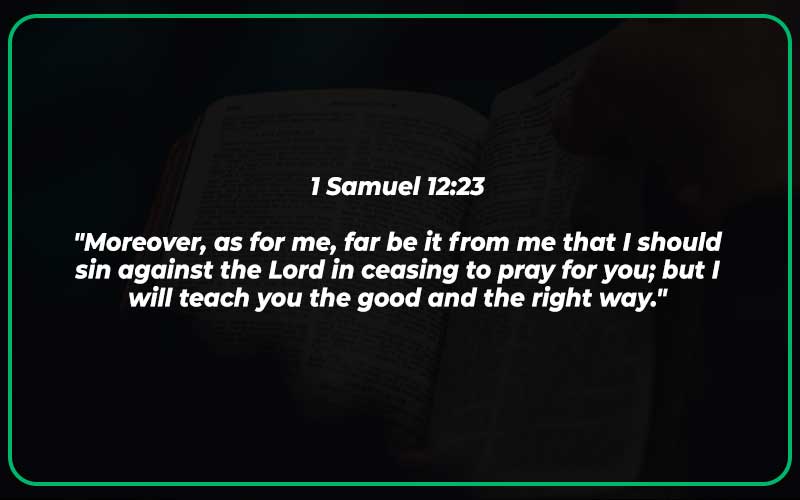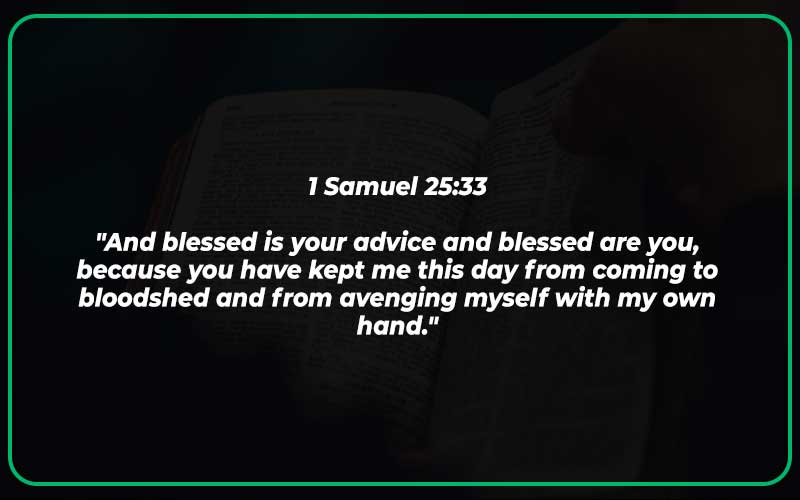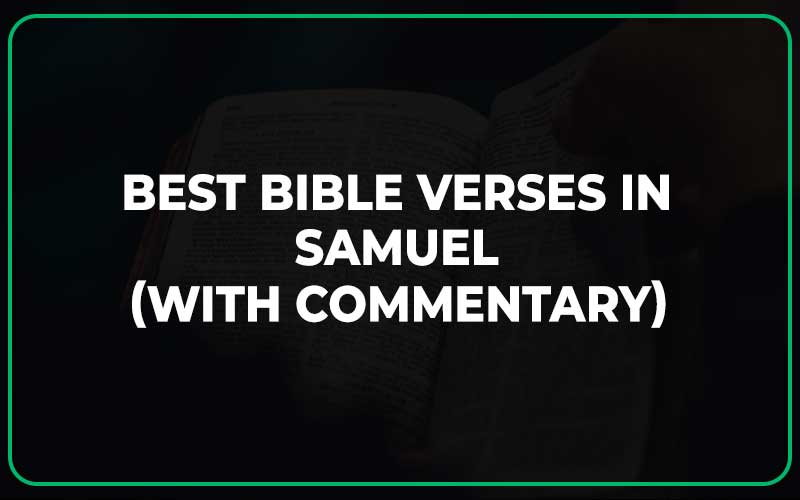Samuel, a key figure in biblical history, played a significant role in the transition from the period of judges to the establishment of the monarchy in Israel. Join me on this enlightening journey as we explore Bible verses that highlight the life and contributions of Samuel.
Through these scriptures, we will uncover lessons on faithfulness, discernment, and hearing the voice of God. Get ready to be inspired and encouraged by the timeless wisdom found in the story of Samuel.
Most Popular Bible Verses in Samuel
1 Samuel 3:10
“Then the Lord came and stood, calling as at other times, ‘Samuel! Samuel!’ And Samuel said, ‘Speak, for Your servant hears.'”
In this verse, Samuel, as a young boy, hears the voice of God calling his name in the night. It highlights Samuel’s receptive heart and willingness to listen and obey God’s instructions.
1 Samuel 3:19
“So Samuel grew, and the Lord was with him and let none of his words fall to the ground.”
As Samuel matured, the presence of the Lord remained with him. His words carried weight and authority, for whatever he proclaimed in God’s name came to pass.
1 Samuel 7:3
“Then Samuel spoke to all the house of Israel, saying, ‘If you return to the Lord with all your hearts, then put away the foreign gods and the Ashtoreths from among you, and prepare your hearts for the Lord, and serve Him only; and He will deliver you from the hand of the Philistines.'”
Samuel, acting as a prophet and judge, encouraged the people of Israel to turn their hearts back to God, forsake idols, and serve Him wholeheartedly. He assured them that if they repented and focused on the Lord, He would deliver them from their enemies.
1 Samuel 9:15
“Now the Lord had told Samuel in his ear the day before Saul came, saying…”
Before the arrival of Saul, God had already communicated with Samuel, revealing His choice of Saul as the first king of Israel. This verse demonstrates Samuel’s close relationship with God and how God entrusted him with important revelations.
1 Samuel 12:23
“Moreover, as for me, far be it from me that I should sin against the Lord in ceasing to pray for you; but I will teach you the good and the right way.”
Samuel, speaking to the Israelites, emphasizes his commitment to faithfully intercede for them and guide them in righteousness. His words reflect his devotion to God and his genuine concern for the well-being of the people.

1 Samuel 15:22
“So Samuel said: ‘Has the Lord as great delight in burnt offerings and sacrifices, as in obeying the voice of the Lord? Behold, to obey is better than sacrifice, and to heed than the fat of rams.'”
Samuel rebukes Saul for his disobedience to God’s command. He emphasizes the importance of obedience over external religious rituals, conveying the message that true devotion to God involves following His commands with a sincere heart.
1 Samuel 16:7
“But the Lord said to Samuel, ‘Do not look at his appearance or at his physical stature, because I have refused him. For the Lord does not see as man sees; for man looks at the outward appearance, but the Lord looks at the heart.'”
As Samuel seeks to anoint the next king of Israel, God reminds him not to judge based on outward appearances. This verse reveals an important principle: God values the condition of the heart over external qualities, such as physical appearance or status.
1 Samuel 16:13
“Then Samuel took the horn of oil and anointed him in the midst of his brothers; and the Spirit of the Lord came upon David from that day forward. So Samuel arose and went to Ramah.”
In this verse, Samuel anoints David as the future king of Israel, following God’s guidance. The anointing signifies the impartation of the Holy Spirit and the divine selection of David for a significant role in Israel’s history.
1 Samuel 28:15
“Now Samuel said to Saul, ‘Why have you disturbed me by bringing me up?’ And Saul answered, ‘I am deeply distressed; for the Philistines make war against me, and God has departed from me and does not answer me anymore, neither by prophets nor by dreams. Therefore I have called you, that you may reveal to me what I should do.'”
This verse portrays the unusual encounter between Saul and the spirit of Samuel, summoned by the medium of Endor. Saul seeks guidance in desperation, having lost favor with God, and hopes that Samuel will provide direction. However, this event ultimately highlights the consequences of Saul’s disobedience.
1 Samuel 28:19
“Moreover the Lord will also deliver Israel with you into the hand of the Philistines. And tomorrow you and your sons will be with me. The Lord will also deliver the army of Israel into the hand of the Philistines.”
In response to Saul’s plea, Samuel prophesies a grim outcome for him and his sons, foretelling their imminent death and defeat in battle. This solemn declaration reflects the consequences of Saul’s disobedience and God’s withdrawal of His favor.
2 Samuel 7:4
“But it happened that night that the word of the Lord came to Nathan, saying…”
This verse highlights the role of Nathan the prophet in conveying God’s message to David. Nathan becomes instrumental in delivering God’s response to David’s desire to build a house for Him.
2 Samuel 7:16
“And your house and your kingdom shall be established forever before you. Your throne shall be established forever.”
God assures David through Nathan that his dynasty and kingdom will endure perpetually. This promise ultimately points to the coming of the Messiah, who would be from the lineage of David and establish an everlasting kingdom.
1 Samuel 25:32
“Then David said to Abigail: ‘Blessed is the Lord God of Israel, who sent you this day to meet me!'”
David acknowledges God’s providence in sending Abigail to intercept his destructive intentions and provide wisdom. This verse demonstrates David’s recognition of God’s hand at work in his life and his gratitude for divine intervention.
1 Samuel 25:33
“And blessed is your advice and blessed are you, because you have kept me this day from coming to bloodshed and from avenging myself with my own hand.”
David praises Abigail for her wise counsel and actions, recognizing that her intervention prevented him from acting out of anger and seeking revenge. This verse showcases the importance of wise counsel and the value of defusing conflicts.

1 Samuel 25:39
“So when David heard that Nabal was dead, he said, ‘Blessed be the Lord, who has pleaded the cause of my reproach from the hand of Nabal, and has kept His servant from evil! For the Lord has returned the wickedness of Nabal on his own head.’ And David sent and proposed to Abigail, to take her as his wife.”
Upon learning of Nabal’s death, David attributes the justice served to the Lord, acknowledging God’s intervention on his behalf. He also decides to take Abigail as his wife, recognizing her wisdom and her role in God’s providential plan for his life.
1 Samuel 28:6
“And when Saul inquired of the Lord, the Lord did not answer him, either by dreams or by Urim or by the prophets.”
This verse reveals Saul’s desperate attempt to seek guidance from God. However, due to his disobedience and separation from God’s favor, Saul receives no response, highlighting the consequences of his actions.
1 Samuel 16:11
“And Samuel said to Jesse, ‘Are all the young men here?’ Then he said, ‘There remains yet the youngest, and there he is, keeping the sheep.’ And Samuel said to Jesse, ‘Send and bring him. For we will not sit down till he comes here.'”
As Samuel seeks to anoint the next king of Israel, Jesse initially overlooks David, his youngest son, who was tending to the sheep. This verse illustrates Samuel’s insistence on waiting for David’s arrival, ultimately revealing God’s chosen one among Jesse’s sons.
Also Read: 25 Bible Verses About a Heart of Stone (With Commentary)
1 Samuel 16:18
“Then one of the servants answered and said, ‘Look, I have seen a son of Jesse the Bethlehemite, who is skillful in playing, a mighty man of valor, a man of war, prudent in speech, and a handsome person; and the Lord is with him.'”
One of the servants identifies David’s impressive qualities, including his musical talent, bravery, wisdom in speech, and attractive appearance. It emphasizes the presence and favor of the Lord upon David.
1 Samuel 16:23
“And so it was, whenever the spirit from God was upon Saul, that David would take a harp and play it with his hand. Then Saul would become refreshed and well, and the distressing spirit would depart from him.”
This verse depicts David’s skillful playing of the harp to bring comfort and relief to Saul, who was tormented by an evil spirit. David’s musical gift, combined with the Spirit of God, had a calming effect on Saul’s troubled soul.
1 Samuel 16:12
“So he sent and brought him in. Now he was ruddy, with bright eyes, and good-looking. And the Lord said, ‘Arise, anoint him; for this is the one!'”
When David finally arrives before Samuel, his physical appearance impresses neither Samuel nor God. This verse reveals that God sees beyond external appearances and focuses on the heart, declaring David as the chosen one.
1 Samuel 16:13
“Then Samuel took the horn of oil and anointed him in the midst of his brothers; and the Spirit of the Lord came upon David from that day forward. So Samuel arose and went to Ramah.”
In obedience to God’s instruction, Samuel anoints David as the future king of Israel. The anointing signifies the divine empowerment of the Holy Spirit upon David, setting him apart for the significant role he would play in Israel’s history.
1 Samuel 18:14
“And David behaved wisely in all his ways, and the Lord was with him.”
This verse acknowledges David’s wise conduct and attributes it to the presence of the Lord in his life. It demonstrates David’s reliance on God and the resulting success and favor he received.
1 Samuel 18:16
“But all Israel and Judah loved David, because he went out and came in before them.”
As David gains prominence, his character and leadership abilities attract the love and admiration of both the people of Israel and Judah. This verse illustrates David’s growing popularity and the positive impact he had on those around him.
1 Samuel 19:9
“Now the distressing spirit from the Lord came upon Saul as he sat in his house with his spear in his hand. And David was playing music with his hand.”
Here, we witness the recurring torment Saul experienced due to the presence of an evil spirit. David’s music once again serves to alleviate Saul’s distress, emphasizing the contrasting effect David had on him.
1 Samuel 19:10
“Then Saul sought to pin David to the wall with the spear, but he slipped away from Saul’s presence; and he drove the spear into the wall. So David fled and escaped that night.”
As Saul’s jealousy and anger intensify, he attempts to kill David with a spear. However, David escapes the danger and flees, avoiding Saul’s wrath. This event marks a significant turning point in their relationship.

What does the Bible say About Samuel?
Samuel is a prominent figure in the Bible, primarily featured in the Old Testament. He is known for his role as a prophet, priest, and judge in Israel. Here are some key points about Samuel according to the Bible:
- Birth and Childhood: Samuel’s birth is described in the Bible as a miraculous event. His mother, Hannah, was barren but prayed fervently for a child. God answered her prayers, and Samuel was born. Hannah dedicated him to God’s service, and he grew up in the temple under the guidance of Eli the priest.
- Prophet and Judge: Samuel became a significant prophet and judge in Israel. He received divine messages and delivered them to the people. He played a crucial role in anointing the first two kings of Israel, Saul and David, in accordance with God’s guidance.
- Leadership Transition: Samuel played a pivotal role in the transition from the period of the judges to the establishment of a monarchy in Israel. He anointed Saul as the first king, and later, at God’s direction, he anointed David as Saul’s successor.
- Intercessor: Samuel is noted for his intercessory role, where he prayed for the people of Israel during times of crisis and offered sacrifices on their behalf. He served as a spiritual leader and guide for the nation.
- Rebukes and Warnings: Throughout his life, Samuel conveyed God’s messages, including warnings and rebukes to the people of Israel when they strayed from God’s path. His words were instrumental in guiding the nation spiritually and morally.
- Legacy: Samuel’s life and leadership left a lasting legacy in Israel. He is remembered as a faithful servant of God who played a critical role in the nation’s history by anointing its first two kings and providing spiritual guidance.
- Death and Burial: The Bible records that Samuel lived a long and respected life and was mourned by the people of Israel upon his death. He was buried in his hometown of Ramah.
The story of Samuel in the Bible illustrates themes of faith, prayer, leadership, and God’s guidance in the lives of individuals and the destiny of nations. His faithfulness to God’s calling and his pivotal role in shaping Israel’s history make him a significant figure in biblical literature.

